Gibson, Fender, PRS & Co.: Do guitar brands matter anymore?
Or is brand-consciousness a thing of the past?
If you were picking up guitar in the ‘90s, chances are you had a whole bunch of mediocre budget instruments to choose from. Or, you could chop an arm and leg off for one of the more established brand names. But is that still the case in 2020?
Like many other people of my generation, I started out on a cheap Squier. It was red and had a maple fretboard. After damaging about every part of it (in trying to figure out how it functioned), I traded it in for another guitar. And so carried on the trading before I landed on my first ‘good’ guitar, a ’62 American Vintage Reissue Fender Stratocaster.
Brand-consciousness
The 62 AVRI was the most expensive thing I had purchased up to that point. And so, much research went into the purchase. In truth, based on the guitar-based music that I had heard up to that point, it had to be either a Strat, Tele, or Les Paul. I didn’t like Teles, I found them uncomfortable, and the Les Pauls I’d played were either too expensive, or not very nice to play. Sure, companies like Ibanez and Jackson had started cementing themselves in the market, but they were relative newcomers, and by the late ‘90s, their angular designs and bright neon colours were already getting dated. But even so, these ‘newer’ brands still used the earlier models as a benchmark, and were often referred to as ‘super’ Strats.
Even when PRS guitars arrived on the scene, they were usually marketed as being able to offer the best of both Gibson and Fender worlds. I also distinctly remember the Parker Fly showing up in magazine ads, being touted as the new industry standard, something that would finally bring in a new evolution of the guitar, and break the hold the afore-mentioned guitar-giants had on the industry. It failed to do that.
Not just guitars
It was the same with amplifiers and effects. As technology became more accessible, and production methods got simplified and cheaper, several products started showing up in the market as alternatives to large, cumbersome and unreliable tube amplifiers, or effects pedals. Does anyone remember the V-Amp, or the first iteration of the POD? But these devices didn’t really hit the mark, and professionals were still shying away from them, if they could. You had to have at least one Fender or Marshall amp if you wanted to be taken seriously.
The general notion was that, if it was made in the USA by an established brand, it was legit, and if it was made in the far-east, it was rubbish.
Evolution of gear
Fast-forward twenty years deep into the 21st century, and the landscape is completely different. Technology has come a long way, and production methods have drastically reduced both time and cost. Instruments and effects manufactured in the far-east no longer carry the stigma that they used to.
Epiphone and Squier, the budget divisions of Gibson and Fender respectively, have expanded their catalogues to include a wide range of instruments at several different price points. The PRS SE range is widely considered one of the best budget models available from the far-east. And several modern players are lending their names to these budget models. Brent Hinds and Lee Malia have their Epiphone signature models, Jim Root and John 5 have their Squier models, and Zach Myers and Mark Holcomb have PRS SE models. Even players like Bernie Marsden, whose Les Paul ‘the Beast’ is as famous as him, has a PRS SE signature model, and Radiohead’s Ed O’Brien has a Mexican-made Strat model (ok, so not manufactured in Asia, but still squarely in the ‘budget’ range).
Budget used to mean bad
And although I’m using the term ‘budget’, it in no way implies that these instruments are of inferior quality. Twenty years ago, a budget guitar meant it would have finishing flaws, gaps, sloppy workmanship, bad materials and parts, and so on. You could be assured the instrument, if used regularly, would promptly fall apart within a few years, during which time it would be struggling to perform optimally. In my opinion, this is no longer the case.
Harley Benton is a very good example. Because Thomann is the sole distributor for Harley Benton, the brand is able to keep costs considerably low, while still being able to provide a certain level of standard. It’s astonishing to me to see the staggering amount of options available on Harley Benton instruments. The brand offers several different styles of not only electric guitars, but other stringed instruments as well. And it’s clear that the design team took care when coming up with the models. Their use of correct woods and relevant hardware and pickups is very commendable, especially given their price points. And this includes the company’s other equipment, like effects pedals.
Not only budget
The PODs and V-Amps have evolved into the Helix, Axe FX, and Kemper Profiling amps. I wouldn’t say these are budget pieces of gear, but they essentially do what those early PODS and V-Amps were trying to, only much, much better. It’s not that big names like Marshall and Fender have been completely forgotten, but even these big brands have had to branch out into other segments of the audio entertainment industry, like bluetooth speakers and headphones.
We recently ran a post on Les Paul Alternatives. It was definitely not an exhaustive one, it couldn’t be. And the comments section reflected that. There are so many alternatives now for certain instruments and pieces of gear, that the ‘big names’ don’t carry that much weight anymore, at least not in ‘real world’ applications.
Musicians I would meet 20 years ago were more brand oriented, and the name on the headstock appeared to reflect one’s skill level, somehow. Nowadays, players seem to be more concerned in how their gear functions for them. It’s quite refreshing.
Picking up a guitar today
If you were to pick up a guitar today, you’d be spoilt for choice. A reasonable budget will get you everything you need to start off. And if you’re really strapped for cash, you could buy used and download an amp-simulation app on your phone.
As guitar-based music, and the guitar itself continues to evolve, newer players don’t seem, to me, to be hung up on brand names. The instrument has evolved so much, that players are picking up instruments that work for them, and the brand seems to be an after-thought. Especially when it comes to modern, multi-scale instruments, or guitars with 7 strings or more…the big names have no points of reference here at all. And other designs, like the headless guitars, are also no longer synonymous with brands like Steinberger.
That’s not to say there isn’t brand loyalty. But that’s a different debate. However, even in that respect, browsing through forums of budget brands like Epiphone, Squier, PRS SE, Harley Benton and the like will show that these brands have very strong support from their fans.
A final thought
After I’d had the 62 AVRI Strat a while, and started becoming nerdy about it, I decided that I might have payed a whole lot for that Fender logo. I realized, that I could have put together a similar Strat, for less, had I obtained the parts from reputable manufacturers like, for instance, Warmoth. In fact, since then, all the hardware and electronics of the Strat have been replaced. Did I have to replace them? Probably not. But the changes brought it closer to how I wanted it to sound and feel. If I wasn’t so hung up then on the headstock logo, I could have probably saved myself a few hundred pounds.
56 responses to “Gibson, Fender, PRS & Co.: Do guitar brands matter anymore?”
 4,0 / 5,0 |
4,0 / 5,0 | 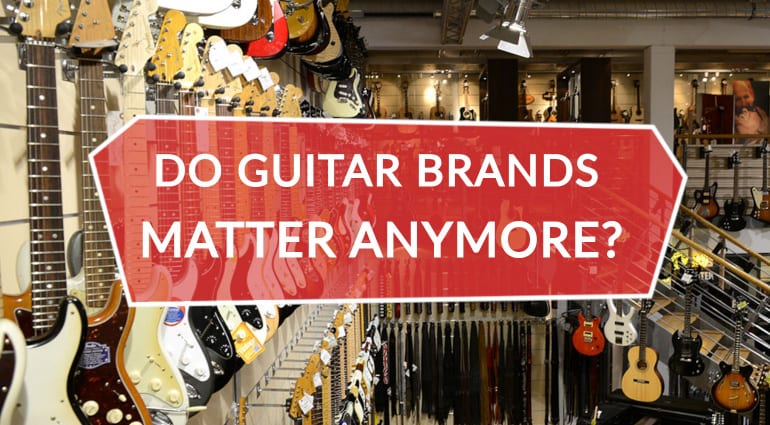

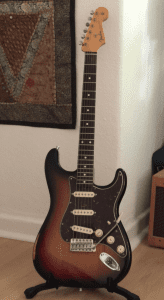
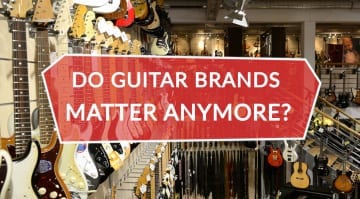

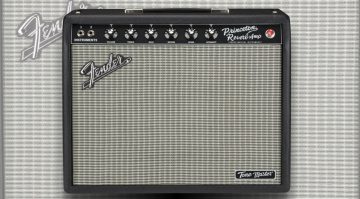
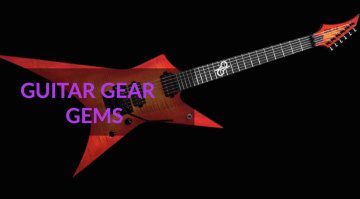
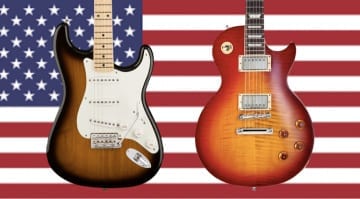
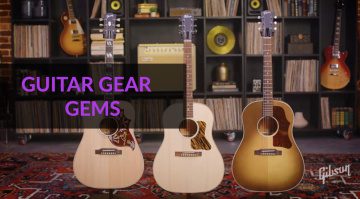
My first two guitars were a Dean and an Epiphone. The Dean was £225; the Epiphone was a whopping £400, and was a huge decision. I still have both 20 some years later – other than having the action lowered, the Epiphone served me well; the Dean’s electronics had to be completely replaced.
Since moving to the US, I’ve gradually been able to afford more expensive guitars. I gravitate towards Fender for the most part because of build quality and specific features, but I recently picked up a Jericho that is among the highest quality, best specified guitars I own.
I feel like Gibson’s build quality took a huge dip, and if I were to buy an SG or Les Paul, I’d absolutely go to one of the lesser known makers these days.
No Fender or Gibson or PRS, at least American made. Way too much money.
High end Squier, Epiphone, or PRS see are way more affordable and, will give you all you want for a lot LESS money.
Well if the sound of the cheesy pickups and the cheapo inferior electronics do it for you, keep buying those cheap azz guitars, somebody has to so the CEOs can buy yachts!
I recently bought an SG style Harley Benton and it is awesome. Great quality the pups are good, the action was great put of the box. I recommend trying one.
I just did this test with 3 of my buddies about two months ago. I put a LP Standard, an Epi LP, and a knock off I picked up at a pawn shop for free (my cousin owns the pawn shop), frets polished and with new strings, one by one into their hands blindfolded. Each of them picked out the Gibson in less than 10 seconds. There’s no comparison.
Does Epiphone make a good LP copy? Yes. Does it feel and play as well as a real LP Standard? Hell no. Is the Gibson worth the extra money? For me, absolutely. For others? Who knows (or cares).
I have several what I call copies.. and genuine Fender Strats .. several.. the US Strats are noticeably better.. same with my Les Pauls vs Epiphone LP .. ESP Ltd.. the Gibson feels, sounds, plays noticeably better.
I’m a huge gibson and fender fan.i started buying mexican made fenders and found them to be every bit as good, or better in some cases than their American counterparts. I own two Nashville made Gibsons but those are the last two. Epiphone from now on. Fret edge binding isn’t worth much to me. Gibsons are so damned expensive now.
In the US the prices of new Fenders and Gibsons cost the same or less than they did in the 50’s when adjusted for inflation. Wages haven’t kept pace with inflation so that makes everything seem expensive as they eat up a larger percentage of one’s income.
I have been playing for about26 years now and I when through many lesser cheap brands as well as a couple Les Paul’s and am Ibanez. This year I was going to buy the new axiom by Ibanez but when I plugged it in my marshall 6100lm head it wasn’t the sound or action I was looking for .. later that week I ran into a Bernie mardsen prs le and I love the action on the fretboard and I decided to put the dimebuckers in the guitar over the stock setup and this thing screams. And I saved about 2500 I got a good deal and my buddies looks the wAy it plays as well. Both sides of prs build excellent guitars.
I’ve long since stop caring about who makes a guitar, what it’s shape is, or what it’s made of. All I care about is the sound of the pickups and having a proper setup. And I kind of care about what color it is. That’s it.
Brand Names Matter until people start listening with their ears and not their eyes.
Yes brands still matter. You don’t pay $2k for a guitar with no brand and unknown hardware even if it sounds killer.
Yes you do if it feels and sounds right
No you don’t, if you also think of the resale value, as many of us would do.
If you’re buy I g for resale,maybe you ought to consider investment brokering instead of music. But seriously it has always been possible to obtain an el cheapo that plays well and even sounds the way you want as well. I started with an Italian Vox which was very modest priced 48 years ago. I also have two USA gibson’s , and they’re great. But, aside from that, I’ve got a Chinese Indio tele copy that cost around $90 us. It’s a great guitar with no problems and came with a padded gig bag too!
Hello,
I started learning playing the guitar at 40, 7 years ago.
Needless to say i just play for my own pleasure and have no other will than having fun, even if i practice 1h1/2 a day.
My point: in my case: of course brand does matter. I have no super ear or super fingers, part of the pleasure is also in touching what all those big brands brought to music. After having started on yamaha I now have 2 us made Fender, 1 std LP and one Martin 000 28.
To the question do only famous historical brands produce good instruments the answer is no for sure.
But does brand matter? For sure yes.
Not to mention l’m a south paw, and it is much easier to trade in some renown instruments the day i want to change.
This article is certainly about electric guitars. Like you, I have a Martin (D-41). I also have a couple of less expensive acoustics. The Martin crushes them.
Also a southpaw. Variety has always been limited. Best part is, nobody grabs your guitar and screws with it.
I’ll stick with my 1995 Parker Fly Deluxe which you have quickly dismissed based on your magazine ad experience with them.
They matter to people who want to emulate their heroes, and own the exact same model guitar. If Jimi Hendrix played a Fender, then people want a Fender. If Elvis Presley played a Gibson, then people want a Gibson.
This article could really do without the orientalist usage of “far east” every few sentences.
Brand names matter when it’s comes to re sale value…
If you take your time and find the right one ,Ibanez and Cordoba acoustics are rediculassly well made except for the tuning machines which is an easy fix .
So if you buy a great sounding and playing Ibanez acoustic for 300.00
Put a k&k passive in it the get a case you will have a 500.00 investment in a tool that will work on any stage .
To me it’s sound playability the wood glue the metal and the person building it that day that make a great guitar .
All guitars that are used on stages have to visit the luthier from time to time .
I at one time had 18 guitars all new brand name big money , I only used two on stage I’m going tomorrow to buy one of those one in a million Ibanez for 300.00 .
I regret not buying a 1947 Gibson j50 perfect with orig case for 3k
And a 1954 archtop f holes with a funky detachable pickup with original case for 900.00 , they both played like a dream and was a mistake not to buy them for an heirloom for children .
Great for photo shoots , crushed on the road…
Guitar brands always related with guitar players / heroes. Music landscape and how we consuming music has changed over the years. If we see again NEW heroes with big stadium bands like Zeppelin, Peppers, Roses, Metalicca, nirvana etc.
then be sure that the brand perception really matters.
For some (most), it’s not about penny-pinching, or hero emulation, or logo-gloating. It’s about pride-of-ownership. It’s about a lineage, history of a pedigree, perhaps even a bucket-list thing for the older players. There’s ONE simple reason why only a few brands/models evoke such qualities and check all the boxes of the list. AUTHENTICITY.
For me it’s never mattered . I’ve always found a guitar that felt good in my hands and done upgrades from there, such as wiring and pickups. Nowadays they make guitars much better, so unless your a collector or you’re trying to be like your favorite stars, WHY???
Not commenting on you specifically, but I see these YT videos where someone buys a Squier, then guts it, replaces all the electronics and tuners, gives it a decent fret job and then declares it as good as a MIA Fender and they only have $800 in it. They never account for their time, though. If one likes to fiddle with things, that’s fine. Me? I’m either playing the guitar or billing $90/hr. working. The time it would take me to ‘upgrade’ a knock-off just isn’t worth it, not to mention that there’s no resale value. The Strat would be so much more worth it in the long run.
Side note: People who make their living playing the guitar are the best examples of whether the brand makes a difference. Vanity doesn’t play into it for them, they just want the best tool for their trade. Know what they’re using? Gibsons, Fenders, and PRSs. (Yes, I know there are a few exceptions, but they are few and far between).
I started playing guitar in 1980. My mum bought me a cheap SG shaped thing from a pay monthly catalogue. It was really bad. After a few years, I bought myself a Hondo Les Paul shaped thing. That was lovely. At the time I was Zeppelin all the way. I wanted a sun burst Les Paul more than anything. Then came Hair Metal, and Shred. I bought a Westone ‘Charvel Model’ shaped superstrat. It’s still my go to guitar today. But I own a PRS custom 24 (which is better than a Les Paul by a million miles), a Japanese Stratocaster… And many other guitars. This is my 2 pence worth :
Something designed in the 1950’s that’s never changed is always going to lag in terms of technology.
Modern superstrats are 15 times the amount of guitar at a 10th of the price.
I think PRS have replaced the Les Paul. It has all the same tones, and more, and it’s prettier. But it’s still overpriced and has tuning stability issues.
But the stratocaster…
The volume knob is in the wrong place. The tremolo is awful..
But there’s that moment you’re on the neck pickup, playing up around the 12th fret when you get that moment… There is no way that you’re playing any other instrument.
It’s a distinctive tone.. that no other guitar has.
The strat will be around forever.
I’ve played around with many brands of accoustic/electric guitars and find I am always drawn back to Ovation and Yamaha. It’s just in the way they sound and feel.
I don’t care they aren’t as big and recognized as others. I go with what I like, not what I can think I should have. I have a small budget and have always found Yamaha has some of the best in my price range.
That’s laughable. Of course it matters. For me, it’s gotta say “ Fender” on the headstock.
PRS have always been, and will always be, the most POS overrated guitars ever. They have great PR department that figured out if you throw a ton of money at famous guitarist, you can hit elite level without actually having to create an elite product. Proving that yes, brand(and by definition: brand marketing) matters. Not to everyone, obviously, but in general, people are always going to pay a premium for a brand name over an equally sounding offbrand guitar.
Building Techniques of non-big name producers have greatly improved. The big question today is, do you want it to be to play well, and sound the way you want it to? Or, do you want those things and investment potential, too?
I still have my first guitar, an 87 MIJ Squier Strat and it’s still one of the best strats, American or import, I’ve ever played. And working at Guitar Center gave me the opportunity to play lots of Strats.
Most satisfying buy by far. Buy the parts and make your own; or buy cheap (that plays well) and upgrade all the electronics. There’s excellent helpful videos on YouTube
I have a epiphone les Paul ultra and love this guitar. I own two Ibanez and a few other brands but sense I got the les Paul the others just sit and collect dust. It has that clean bluesy sound that I just love.
I would say brands still matter. I like having “Gibson” on the headstock of my Chibsons.
Thanks for also mentioning the DIY or partscaster market. As someone who has built many a nice partscaster, I’ve come to realise that brands do matter, as soon as you want to sell the guitar and try to get enough out of it to at least cover the costs for the parts. Impossible!
Building partscasters is great fun, but the money you put into them is basically lost. That’s the sad truth, so yes, brands do matter!
You’d have to find a buyer who falls madly in love with this particular axe and would be willing to pay for it. Otherwise you’re screwed.
My first guitar I made to spec in a woodshop in school it was a strat-copy taking microchromatic measurements on a vintage Olympia strat that the teacher proudly hailed as the same as Mister hendrix’s guitar. I sunk some money into the best pickups I can find as well as good wood and things, (growing up on Long island in the 70s and 80s was where it’s at and finding quality accessories was fairly easy)… Long story short I sold it for $400 a year later a $290 profit to use in a touring band-cool-the teacher now owns it allegedly from what I heard, my first real guitar a 76 Les Paul in 1980 I was given a help from a music store owner who sold it to me for a great price had that for a few years it needed the two-way switch and tone and volume components… That was a great guitar! now I have a squire strat (Rescue):and my starcaster which my wife bought for me Christmas 2007- —surprise-I’d like to try the new starcaster hollow-body I’ve been looking at a stop making them for a while but I kind of like it two single coils in a humbucker which is actually two single coils together but great sound remind me of the strat I made what a great guitar I love guitar ssss
You have something against periods?
It matters. Been playing for 20+ years in many many different settings (countless times live). I played “budget” instruments for years (Schecter, Agile, Takamine). They’re great. They’ll get you most of the way there. Just one little problem, they won’t get you “that” sound.”
Now I only need two guitars:
My Gibson Les Paul Standard
And
My Gibson J-45 Standard
The others are just backups and for risky gigs.
They’re simple the best and they’re actually very cheap.
Ever seen violin and cello prices?
The LP Standard is one of the most versatile instruments on planet earth. It can do more than all of my others combine.
The J-45 is the same way in the acoustic world.
Peace and keep jamming!!
Way I see it, there are much cheaper brands that make guitars that produce similar or downright better tone. Harley Benton has recently become my favorite guitar brand for doing exactly that.
I can’t justify paying 3000.00 for a guitar you have to have the action set up up on and leave in a dehumidifier case, that to me is the true definition of crazy
In my country Indonesia..only Gibson has a decent resale value..which to me is important…PRS Core U S A models lose so much value..as much as 60 percent..as much as I love the new Santana Core Retro 2020, it loses value too much and the availability of parts for PRS is nil…So I buy exclusively Gibsons…do not get me wrong..I love the 4600 u.s dollar Santana and 4200u.s dollar McCarty Single Cut.PRS Custom 24 mint with 10 top sells for only 2800 u.s dollar…and takes ages to sell..otw a mint R9 can be had for 4600 u.s dollar and be sold in one day…Fenders also loose values…and because second hand Fenders are plenty..Custom Shops and regular lines…So my considerations for buying Gibsons(and I am set in stone playing their scale length and neck profiles) is resale value..parts are plenty…and I just plain love them…I am familiar and I have all the set up tools for Gibsons…I do have PRS Zakk Myers SE that I use for drop tuning and second hand Fender Highway One that I modded with Custom 54 pick ups and treble bleed…
I built ,y own Jazzmaster with a Guitarfetish body and a Warmoth neck. As spec’d, this would cost me nearly $3k in Fender-world, but in reality it cost $600USD. I ordered a Balaguer semi-custom for $2k based on the customer responses to thier previous builds….in Fender/Gibson-world, that would be in the $5k range. That’s insane!!
I built a warmoth strat end of last year…it is so awesome it makes me want to build more but I don’t need more.
I think quality still matters. I think brands that are upstarts can be deeply committed to quality and eventually match long time brands. The issue is commitment to quality maintained over time. Everyone complains about Gibson, but few have stayed in business at the same level for so long. Hard to do. When it comes to semi-hollow guitars they do something very well. Heritage does it, but even they have had to update to modern methods now. Many guitars made in Korea are amazing. But usually it’s a partnership with brand that has a clear vision and a commitment behind the guitar. For example: Korean made Gretsch guitars are amazing and well under $1k. So I think brands matter in the long run but we are in a time of transition. New brands are paving the way to the future. I hope the classic brands survive the journey and continue the traditions that make all the cool innovation possible. I love modern guitars that make sounds with new tech because that’s what electric guitars were all about. I don’t think any of the original electric guitar designers would be anything but thrilled with the innovation and would take advantage of it with new modern lines to go along with classic lines. Anyway these are my thoughts… Good article with good questions.
Mex Strats are often gigworthy.
Buying a guitar you like to play and sounds good to youisxa whole different thing than an investment. I have a American strat an American tele deluxe both stock I never play. I have a Squire tele I’ve missed a lot that’s my player and not ashamed of it. To each they’re own. Rick in.
I have a strat, an SG, a les Paul and an explorer but I could sell them all now as my Gordon Smith GS2 is just the perfect guitar for me… I will replace them all with GS eventually
Hey an honest article, I like it. I learned after 20 years that indeed brand does not ALWAYS matter. In my experience what matters the most is the player knowing how to set up the guitar.
I’ve have/had Gibson, fender, Jackson, Washburn, esp and my favorite guitar of all…is one I built myself from a raw kit. (Meaning completely unfinished kit with non fitted neck joint n other parts, it was up to me to sand, grind down, shape and place everything correctly). Its tele style with double Gibson 490 humbuckers I got seperately. I knew my stuff by the time I attempted this and the result was amazing high quality guitar with great intonation and best action that a guitar can possibly get, no buzzing, no problems. Yes the kit you buy makes a difference too, but I have plenty of other examples of the same principal.
I love to resurrect dead/broken guitars and have done it countless times. One of my best that I kept is a “first act” guitar that I pulled from a trashcan off the street, it was in multiple pieces and I repaired and rebuilt/refitted it, set it up properly, replaced nonfunctioning pickups and replaced all wiring and it’s ridiculously good. I covered all logos and branding and let ppl play it and nobody was able to guess what it is. Everyone usually guesses it’s a 300-500$ guitar and I have to prove its first act before they believe me. All this rambling can be summed up with…If you know guitars, I mean really know your stuff, brands do not matter. If you don’t know your stuff, you’d best learn or buy an expensive brand and hope they knew how to set it up.
My stable has had:
’68 LP Custom – G
’80 LP Custom – G
’94 LP Standard – G
’00 LP Standard – E
’04 LP Studio – E
’63 Strat – F mia
’87 Squier Strat – F Japan
’96 62 Reissue – F Japan
’96 50th Anniv Strat – F mia
Aloha Strat – Fender CS
Playboy Strat – Fender Custom Shop
The custom shop and MIA’s are hands down the better. The 80’s Japanese strats were getting really close when they switched to cheaper countries. Mexi-strats used to be clumsy pieces of firewood that have come along way. Epi’s, not as good the top tier, but not bad for the $’s.
As stated by many others, when it comes time to part ways, name brand can be the difference between appreciation and stagnation/depreciation.
IE: my vintage 68 LPC, huge ROI, whereas my vintage Kramer aluminum neck Travis Bean copy not anywhere near that.
I have a bunch of guitars. Been in many bands and I’ve found that if you are a professional or run a studio that name brand might be your thing. Its like buying snap on tools vs something else. If its your money maker you should use the best equipment. But for playing dive bars for fun or instructing students, mid level mim fenders, squiers, epi’s etc are 90% of the top brand for 1/3 the price. They play well and I dont worry too much about dings or theft. I do have one old usa made peavey I use it for recording only nowadays.
!0 years ago I bought a Recording King ROS-627, which is an exact copy of the Martin 000-28vs, except it was one fifth the price. I honestly can’t tell the difference between the two. I think you pat a lot for the name and not the quality.
Since you can buy a guitar made in the Far East which (at least to unbiased ears) sounds every bit as good as a mega-priced Gibson, for a fraction of the price, with similar or identical build quality, it would seem that only musical snobbery is keeping the big boys afloat.
While I think budget instrument for the beginner or intermediate player have come a long way, there is still a massive difference between a $400 guitar and one that is $1000 or over. You can get a decent guitar for $1000 used (think an ESP -MIJ or an Ibanez made in Japan if it is older, or some of their newer very well made products from Indonesia).
As someone who also plays drums I have to be honest- if you really play a lot just please spend a little more and buy something that will last and sound good. I had a Mapex Mars Pro M series for years, made in Taiwan back in the early days of their factory. Years later I finally upgraded to a Gretsch USA Custom kit. 100% different- much MUCH better. The quality was noticeable not just the sound. No strange rough drum shellings on the interior, oddball fixtures that were off, etc. Everything was on point and had real quality control.
I can say the same thing for a Cordoba guitar I have (an FCE55) it is about 1,000x better than a cheapo Classical no-name brand I had in the closet.
I still have an Epiphone but want to replace it as soon as possible. It has serious quality issues. Maybe a new person wouldn’t know (since that was my first guitar I had no clue and no budget), but if you want something that will be good for longer- just save and get something better, or buy something used.
“Does anyone remember the V-Amp, or the first iteration of the POD? But these devices didn’t really hit the mark, and professionals were still shying away from them, if they could.”
That’s like writing “Does anyone remember Carnosaur, or the first iteration of Jurassic Park? But those movies didn’t really hit the mark, and moviegoers were still shying away from the theaters, if they could.”
Listing the inferior, notably less successful ripoff before the product it shamelessly Xeroxed? Implying that POD was not only universally panned, but didn’t sell hundreds of thousands of units? The original POD was EVERYWHERE, on countless albums throughout the late 90s and early 00s, as were the SansAmp PSA-1 and Marshall JMP-1, direct into the board.
Clueless.
You are currently viewing a placeholder content from Facebook. To access the actual content, click the button below. Please note that doing so will share data with third-party providers.
More InformationYou are currently viewing a placeholder content from Instagram. To access the actual content, click the button below. Please note that doing so will share data with third-party providers.
More InformationYou are currently viewing a placeholder content from X. To access the actual content, click the button below. Please note that doing so will share data with third-party providers.
More Information